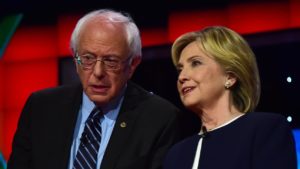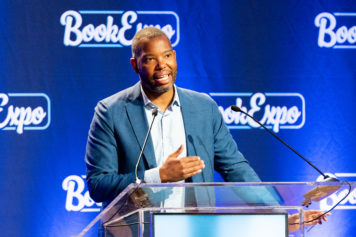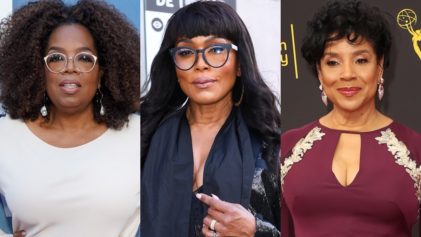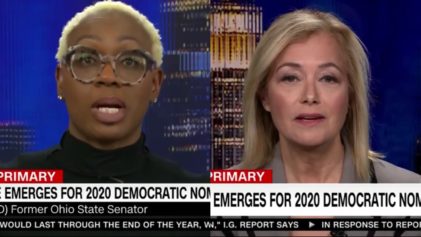
Presidential hopeful Bernie Sanders (L) speaks with Hillary Clinton during the first Democratic presidential debate in Las Vegas, Nevada on October 13, 2015. (FREDERIC J. BROWN/AFP/Getty Images)
The battle taking place among the Democratic candidates for president has shaped up into a more contentious contest than political observers originally contemplated. On the eve of this political season, Hillary Clinton was assumed to be a shoo-in for the nomination due to her experience, credentials and name recognition, while Bernie Sanders was dismissed in some circles as a fringe leftist candidate with limited appeal.
Hanging in the balance is the Black vote, which has emerged as the deciding factor. After contests in the whitest states in the land — Iowa and New Hampshire — the competitors move on to South Carolina and other, blacker spaces and browner pastures. Black voters have the power, and both candidates are vying for their votes. They are the king and queen makers in this equation, at a time when African-Americans are undergoing a maturation process, a political awakening and a heightened sense of social and cultural consciousness.
But will Black voters realize the power they hold and put it to good use for the Democratic nomination, the general election and beyond? That’s the question. And in answering that question, it is incumbent upon the African-American electorate to think strategically and choose wisely in terms of their interests.
In a commentary in The New York Times, Charles Blow argues that the manner in which some Bernie Sanders supporters talk down to Black voters does him a disservice. He calls it “Bernie-Splaining,” the mindset that insists Black people should know that Sanders best represents their interests. Invoking James Baldwin, who eloquently promoted the notion that Black people have served as political pawns, “political weapons, the trump card up the enemies’ sleeve; anything promised the Negroes at election time is also a threat leveled at the opposition.”
According to Blow, Black voters are instilled with a sense of “functional pragmatism” that could possibly work to the detriment of Sanders, not that they love Hillary.
“Black folks don’t want to be ‘betrayed by too much hoping,’ and Sanders’s proposals, as good as they sound, can also sound too good to be true. There is a whiff of fancifulness,” Blow declared.
Appearing on Democracy Now!, writer and author Ta-Nehisi Coates took a different approach, announcing his support for Sanders, despite being critical of the senator’s opposition to slavery reparations:
I expected more. And maybe I’m wrong for that. I just expected more, you know? As I said earlier in the interview, I’m thrilled. You know, I was stunned to see how far he’s come. But I’m thrilled to see an actual radical, left-wing, you know, uniquely left-wing option in the Democratic Party. If we can’t get the left — if we on the left can’t embrace this idea that Black folks have been specifically injured and that there should be specific remedies for that injury, then we have no hope. You know, we really, really have no hope. And so, you know, forgive me for expecting more of Senator Sanders than I expect of Senator Clinton, but I do.
Additionally, Coates critiqued Sanders’ universalist approach, arguing that an all-encompassing policy is inadequate to address the specific injury inflicted on African-Americans. He said that what Black people have experienced go beyond class or impoverishment. Further, he said that the concept of class is not identical in the Black and white communities: “You can’t make a direct comparison between middle-class African-Americans and middle-class white Americans, affluent African-Americans and affluent white Americans. The amount of wealth tends to be less,” Coates said. “The neighborhoods that Black people tend to live in tend to be of lesser quality. The institutions and the services that Black folks receive from the government tend to be of lesser quality.”
Racism, Coates added, undermines universalist social policy in America, as there was a concern about Black people being included in the New Deal, and more recently in Obamacare.
Meanwhile, Michelle Alexander wrote a stinging commentary in The Nation, in which she promoted the idea that Clinton does not deserve nor should she receive the Black vote. The legal scholar points to Clinton’s support for welfare reform and crime legislation that led to the mass incarceration of Black people. She laments that Black people have loved and continue to love Hillary.
“What have the Clintons done to earn such devotion? Did they take extreme political risks to defend the rights of African-Americans?” she asked. “No. Quite the opposite.”
Alexander wrote about then President Bill Clinton’s federal “three strikes” law and the $30 billion crime bill in 1994 that gave mandatory life sentences for some three-time offenders, created scores of new federal capital crimes, and provided $16 billion for state prisons and police:
When Clinton left office in 2001, the United States had the highest rate of incarceration in the world. Human Rights Watch reported that in seven states, African-Americans constituted 80 to 90 percent of all drug offenders sent to prison, even though they were no more likely than whites to use or sell illegal drugs. Prison admissions for drug offenses reached a level in 2000 for African-Americans more than 26 times the level in 1983. All of the presidents since 1980 have contributed to mass incarceration, but as Equal Justice Initiative founder Bryan Stevenson recently observed, ‘President Clinton’s tenure was the worst.’
Meanwhile, Huffington Post sounds the alarm on the young people’s vote, as Millennials react to corporate power with skepticism, and may be uneasy with a candidate such as Clinton, who sat on the Walmart board of directors and made millions of dollars in fees speaking to Wall Street. Further, as NPR reported, young, Black college-aged voters in South Carolina are lukewarm on Clinton, reflecting not only ambivalence towards her, but her husband’s policies as president. This reality could thwart Clinton’s plan to secure the Black vote.


